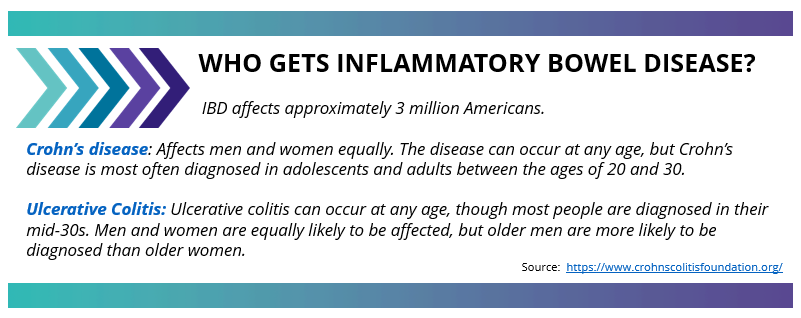Putting a Face to the Disease: Joe Valetti, Crohn’s Disease

Patients with Crohn’s disease and ulcerative colitis can, and do, lead happy and productive lives. However, when these diseases are active, they can significantly impact the quality of life for patients due to flare-ups and complications.
Joe Valetti, a patient care advocate at AllianceRx Walgreens Pharmacy, was diagnosed with Crohn’s disease in 2012. In this interview, Joe shares his journey with Crohn’s disease, including how he felt when he was diagnosed, what it’s like living with Crohn’s disease, the role of the specialty pharmacy, and more.
Understanding IBD
Inflammatory bowel disease (IBD) is a term used to describe disorders that cause chronic inflammation of your gastrointestinal (GI) tract. The two most common forms are Crohn’s disease and ulcerative colitis.1
While Crohn’s disease and ulcerative colitis are both chronic autoimmune conditions that cause inflammation in the gut, there are important differences. Ulcerative colitis affects the innermost lining of the large intestine, which becomes inflamed and develops tiny open sores, or ulcers. Crohn’s disease can impact the entire gastrointestinal tract, from the mouth to the anus, and can impact the entire thickness of the bowel wall.

The Impact of Diagnosis
How did you feel when you were diagnosed?
Truly I was scared. At the time, I was living in Milwaukee, Wis., and visiting my mother in nearby Kenosha. While at her house, I passed out and hit my head on a coffee table. I later learned this was because the Crohn’s disease had caused me to become malnourished. I was admitted to the hospital where I stayed for 6 months, three3 of which I spent in the intensive care unit (ICU). After that, I was admitted to a nursing home to continue recovering. Because my Crohn’s had caused several health issues, I was in a wheelchair. I spent most of my time in physical rehab learning to walk again.
What impact does Crohn’s disease have on your daily life?
Having Crohn’s disease has had a great impact on my daily life. I have several medications I need to take daily, beginning early in the morning. Because of Crohn’s, I have pain daily ranging from body aches to multiple digestive and intestinal issues. My diet is limited to what I can and can’t eat.
Because my body doesn’t absorb the necessary nutrients someone might normally absorb; I take multiple supplemental medications and dietary supplements. I also must make sure I constantly stay hydrated.
 |
|
Joe Valetti pictured with his mother, Karen, at a Green Bay Packers game. |
Managing Therapy
Do you feel that your medication helps improve your quality of life?
Yes. I wholeheartedly feel that without my medication, my quality of life would be miserable. I did have to try three therapies prior to my current medication until I found one that worked for me.
What would you tell someone who is scared to start taking medication?
While starting a new medication can be a scary experience, it can be a life-changer and extremely necessary. Without therapy, the pain and symptoms may be much worse. Communicating with your physician and pharmacy is key to staying on therapy, managing your symptoms and overall, feeling better.
The Specialty Pharmacist’s Role
How can a pharmacist help Crohn’s patients stay on therapy?
My pharmacist helps me manage my medication by letting me know how many refills I have remaining, obtaining new prescriptions when I am out of therapy, and answering my medication questions. Communication and education are key to staying adherent to your medication regimen.
What should pharmacy staff know when talking to patients with Crohn’s disease?
If a patient seems angry, anxious, upset, or nervous, pharmacists should know it’s not personal. If a patient is feeling like this, it’s probably because they know what can or will happen if they don’t get their therapy in a timely manner. More than likely, they have experienced it before and don’t want to experience it again. Always approach any patient or physician office like you would if it was your family who was calling. Treat them like you, your parents or children would want to be treated.
What would you tell someone newly diagnosed with Crohn’s disease?
I currently participate in a volunteer hospital group to help guide newly diagnosed patients and their caregivers. I always remind them: You have Crohn’s, but Crohn’s doesn’t have you. It can be a scary and unpredictable illness. I also encourage them to never give up. While it’s a huge life adjustment, you can live a normal life. A lot of the times patients worry if they must have a colostomy, what people will think, and how others will judge them. I share my experiences with patients and caregivers that when I had my colostomy, no one ever knew unless I told them. I worked and still had a social life while having a colostomy and the support was overwhelming.
Parting Thoughts
I’ve had numerous surgeries and my Crohn’s has led to numerous other ailments. However, I would remind them, “You’re much stronger and more resilient than you think you are. Never give up hope or let yourself get down about anything in life. You can do anything you want or need to do, as long as you push yourself and have the drive.”
Helpful Resources:
Welcome to AllianceRx Walgreens Pharmacy patient education booklet – English
GUÍA PARA EL CUIDADO DEL PACIENTE DE farmacia especializada
Understanding Crohn’s Disease and Ulcerative Colitis patient education booklet– English
¿Qué son la enfermedad de Crohn y la colitis ulcerosa?
Back to Blog > Blog Stories



